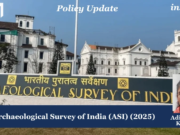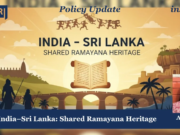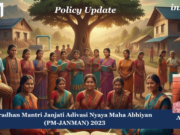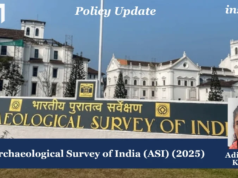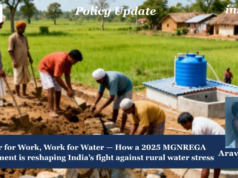Policy Update
Sivasankari
Background
The National Institute of Electronics and Information Technology (NIELIT), under the Ministry of Electronics and Information Technology (MeitY), has been instrumental in advancing IT and electronics education across India. To streamline the enrollment and management of its diverse learner base, NIELIT introduced the Online Student Information and Enrollment System (OSIES). This platform serves as a comprehensive digital interface for student registration, course enrollment, examination applications, and certificate tracking.
Recognizing the need for a centralized system to manage the growing number of students and courses, OSIES was developed to integrate various services that were previously handled separately. This initiative aims to enhance efficiency, transparency, and accessibility for students, educators, and administrators alike.
Functioning
The OSIES operates as a unified platform, offering a range of services to students and accredited institutions:
Student Registration: Learners can create a unique profile that remains valid for a specified period, covering multiple courses.
Course Enrollment: Students can browse and apply for various NIELIT programs, including O, A, B, and C levels, as well as short-term and specialized courses.
Examination Services: The portal facilitates exam form submission, fee payment, admit card downloads, and access to results and grade cards.
Institute–Student Linkage: Accredited institutions are digitally connected, ensuring transparency in student data, attendance, and exam eligibility.
Document Management: Students can access hall tickets, grade cards, and certificates directly, reducing reliance on physical documentation.
Designed to be mobile-friendly and accessible even in areas with limited internet connectivity, OSIES reflects NIELIT’s commitment to inclusive digital education.
Performance
Since its inception, OSIES has demonstrated consistent growth and adoption:
By 2024, over 20 lakh students had registered through the system for various courses.
More than 800 accredited institutes across India utilize the platform.
Thousands of candidates enroll annually for the flagship O/A/B/C level IT programs, alongside short-term courses in emerging technologies such as artificial intelligence, cybersecurity, data science, and the Internet of Things (IoT).
Services like online certificate verification have been adopted by employers and government departments, enhancing the credibility and authenticity of NIELIT qualifications.
While comprehensive public dashboards are not available, updates from NIELIT’s annual reports and communications from MeitY highlight steady growth in digital enrollments and service utilization.
Impact
The implementation of OSIES has yielded several positive outcomes:
- Efficiency and Transparency: The centralized platform has standardized processes, reducing duplication and delays associated with manual systems.
- Accessibility for Students: Learners, especially those in remote areas, can now register and apply for courses without the need to travel to physical centers, lowering costs and barriers to entry.
- Employer Confidence: The ability to verify certificates online has increased trust among employers and government agencies, ensuring the authenticity of qualifications.
- Alignment with Digital India Initiatives: OSIES supports the government’s vision of a digitally empowered society by promoting paperless, transparent, and accountable education systems.
Despite these advancements, challenges remain, particularly for students in rural areas with limited internet access. NIELIT continues to explore solutions to bridge this digital divide, including the development of offline modules and regional facilitation centers.
Emerging Issues and Recommendations
To further enhance the effectiveness of OSIES, the following areas require attention:
- Digital Divide: Addressing connectivity issues in rural and remote areas through the provision of offline modules and establishment of regional facilitation centers.
- User Interface and Accessibility: Improving the platform’s user interface to make it more intuitive and accessible, including the introduction of multilingual support to cater to diverse linguistic backgrounds.
- Integration with National Platforms: Linking OSIES data with national education and skilling platforms to ensure seamless portability and verification of credentials.
- Performance Monitoring: Establishing publicly accessible dashboards to monitor enrollment trends, course completion rates, and employment outcomes, thereby enhancing accountability.
- Data Security: Strengthening cybersecurity measures to protect sensitive student information and ensure compliance with data protection regulations.
Way Forward
OSIES has become a cornerstone in NIELIT’s efforts to democratize access to IT and electronics education. By addressing existing challenges and implementing the recommended improvements, the platform can evolve into a comprehensive national model for digital enrollment systems. Strengthening its integration with national education and skilling platforms, while prioritizing inclusivity and data security, will ensure long-term sustainability and impact.
As India progresses towards a digitally skilled workforce aligned with the National Education Policy (NEP) 2020 and the Digital India vision, OSIES stands as a testament to how technology can bridge administrative gaps in education and skill development.
References
About the Contributor: Sivasankari S. is a Research Intern at IMPRI, New Delhi, and is pursuing a B.Sc. Economics from Dr. B. R. Ambedkar School of Economics, Bengaluru
Acknowledgement: The author sincerely thanks the whole IMPRI team for their valuable support.
Disclaimer: All views expressed in the article belong solely to the author and not necessarily to the organisation.
Read More at IMPRI:



